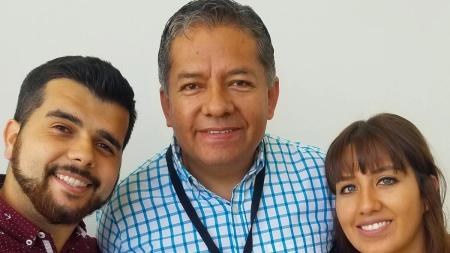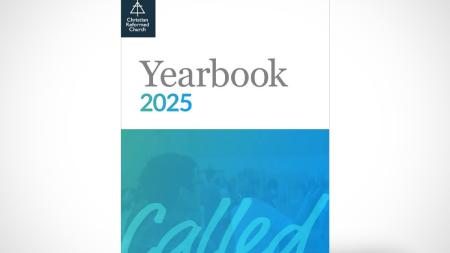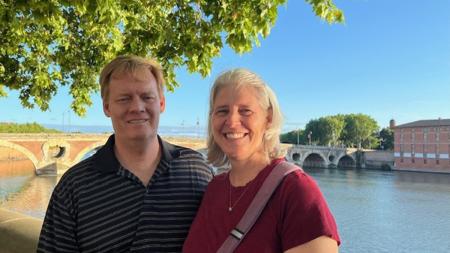Synod Review Task Force Report Available for Review and Comment

Synod, the annual decision-making meeting of the Christian Reformed Church in North America, made a request in 2016 that a group be appointed to research, examine, and review the principles, practices, and functions of this annual meeting (Acts of Synod 2016, pp. 826-27 ).
The report from that Synod Review Task Force (SRTF) is now available and will be presented to Synod 2019 next June for discussion and decision. In the meantime, Christian Reformed churches and regional groupings now have the document available for their review.
Over the course of two years, the SRTF carefully reviewed evaluation forms that had been submitted by the men and women who attended Synods 2012, 2014, and 2016 as delegates or advisors.
In addition, the group conducted comprehensive audits about the time allocations for Synods 2016 and 2017 (see Appendices A and B of the report). The task force also surveyed the clerks of all classes (regional groupings) of Christian Reformed churches across North America.
Based on this work, the SRTF made several recommendations for the future. Overall, they found that the current process of holding a synod is well accepted. They did, however, suggest that Synod 2019 consider adopting the following recommendations, among others:
- That synod recognize that, in general, the current format for conducting synod, along with the typical agenda template, has served the denomination well.
- That synod follow a cycle of annual meetings taking place in Grand Rapids, Mich., for three years in succession (one of which could be at another midwestern location nearby, such as Chicago) followed by a fourth-year meeting in a region elsewhere in North America where CRC congregations are clustered, with contributions to the additional costs of the fourth-year meeting to be drawn from classes without financial hardship.
- That synod meetings continue to be supported by ministry shares (as managed by the denomination’s administrative office) with the introduction of a modest contribution from classes in the form of a “delegate registration fee” and partial payment of travel costs. Note: Such contributions would be waived for classes experiencing financial hardship and would be increased for classes without financial hardship.
- That synod encourage classes to develop and/or maintain policies through which the classis would provide remuneration to delegates who are financially disadvantaged through service to synod.
- That synod arrange for a volunteer on-site mentor/guide and offer that person’s service to young adult representatives and ethnic minority persons (advisers or delegates) to familiarize them with synodical procedures, to assist them in preparing to actively participate in synodical sessions, and to help them process their learning at synod.
- That synod create a process, to begin in 2020, of selecting at the end of synod each year a president, a vice-all, and a clerk to serve the following synod.
- That synod no longer elect a second clerk as an officer of synod but have a staff member take minutes in close proximity to the clerk.
- That synod instruct the Council of Delegates to periodically recommend a plan for a “themed agenda” or “themed synod” in which, alongside indispensable components of a typical synod agenda, the primary focus would be on a visioning or leadership theme germane to the health and growth of the entire denomination.
- That synod follow a set meeting schedule that includes the following:
a. Begins with orientation exclusively for the chairs and reporters of advisory committees the evening before synod convenes in preparation for advisory committee meetings.
b. Provides orientation for all (not just first-time) delegates and advisers prior to the convening session of synod.
c. Provides adjournment no later than mid-afternoon on the fourth day of plenary sessions, and possible deferment of unfinished items on the agenda to the following synod or to the Council of Delegates. - That synod include time for worship and prayer in its schedule [as follows]. . . . Synod would begin each morning with a time of worship planned by a committee appointed by the program committee of synod and convened by the denominational Worship Ministries Office, with the exception of the final day when synod concludes with worship.
- That synod organize its work each year to reflect the five ministry priorities adopted by Synod 2015.
Ground: Synod 2015 endorsed five “ministry priorities to strategically focus and adaptively organize the work of the Christian Reformed Church in North America . . .” (Acts of Synod 2015, p. 680). - That synod limit its agenda in any given year to include no more than two major study reports so that fuller and more thoughtful discussion can take place.
The full report is available online, and all CRC congregations have received notification of its availability at crcna.org/SynodResources. Churches may request a hard copy by contacting Faith Alive Christian Resources at faithaliveresources.org or 800-333-8300. Synodical study reports like this are distributed early in order to give church councils and classes time to review and discuss them.
If councils or classes have an opinion about how Synod 2019 should respond to the report, they are invited to send their suggestions to next June’s meeting by means of an overture or communication by Mar. 15, 2019.
Steven Timmermans, executive director of the CRCNA encourages all church councils and classes to consider this report carefully.
“If you have any questions regarding proper procedures, please contact the Synodical Services Office, the executive director of the CRCNA, or refer to the Rules for Synodical Procedure (pp. 7-9) available at crcna.org/SynodResources,” he added.


